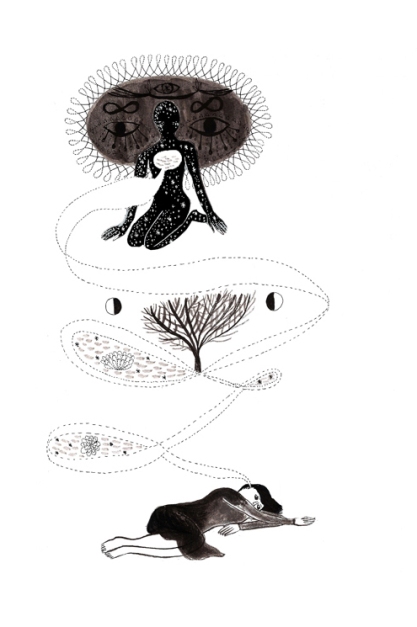Today in our culture is a fatphobic mess: I’m sure you’ve seen the trash that is Insatiable all over the internet today.
For those of you who are new to the fatphobic, absolutely disrespectful and diet-culture laden series trailer premiere, welcome.

I’m not going to post the trailer itself here for people to view. You can look it up on your own if you want to see the word “fat” weaponized back into its pejorative form, stereotypes about binge eating perpetuated, and bullying toward a fat person (who isn’t actually a fat person) normalized and used as a feature plot for “revenge.”
Yep, it’s everything terrible you thought it would and could be.
Basically the main character, Patty (chosen because it rhymes with “fatty”…how original)…who is actually just Debby Ryan in a fat suit (which I don’t even have to tell you is insulting), is being bullied for her weight constantly. At one point in the trailer, she is assaulted via being punched in the face, causing her to have to have her jaw wired shut for an entire summer. During this time, she loses a bunch of weight (apparently) and becomes thin and “hot”, (two words not synonymous by default) and uses her new appearance to get revenge on the people who hurt her emotionally and physically throughout her teenage years.
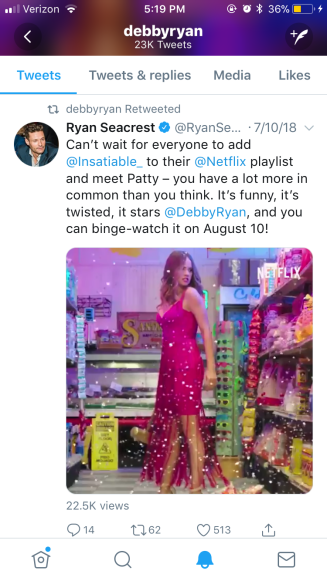
I’m not going to use the rest of this post to take my anger out on Debby Ryan (I already did that on twitter for most of today), especially after she defended her role in the show for the purpose of “spreading awareness about binge eating disorder” … which we all know is a bunch of absolute BS considering that the show’s literal premise is that now that Patty is thin after restricting for a full two months, she has infinite possibilities to be “a brain, an athlete, or a princess” (none of which her fat was stopping her from doing in the first place).
I found the entire show’s poor excuse for a plot line even less disturbing than the advertisements for it, laden with stereotypes about fat people, loaded fatphobic language, and outright justification for the show’s existence.

Ryan Seacrest even had the audacity to use the term “binge-watch” to encourage people to view a show that does nothing but validate the mistreatment of fat people until they are thinner. I guess binge watching is more okay than binge eating because you don’t get *gasp* fat from watching too many terribly written TV shows. Maybe the thin privilege reeking from this series will enter my life by osmosis!
It makes it seem a lot like the whole “inside every fat girl there’s a thin girl dying to come out” trope pushed on us to be not just a point worth making, but one that fat girls should be expected to hear and take seriously. Not just that–it propagates the myth that once we find ourselves under all that fat, we will somehow be more deserving of respect than we were before.

Let’s address some realities of binge eating disorder, from someone who has more than 10 years experience with the behaviors that come with it–and then some.
Debby Ryan did get one thing right when she was trying to justify her role in this atrocious Netflix Original. Binge eating disorder is the most common eating disorder on the spectrum. This is according to both NEDA, BEDA, and even the DSM. But despite this, BED wasn’t even recognized as a disorder until 2013–so for a long time, people with BED have gone largely misrepresented or underrepresented altogether. And it’s not okay.
The creator of the show, Lauren Gussis, even revealed her own struggle with an eating disorder in adolescence. But anyone who has survived an ED, who lives in a fat body (which she doesn’t), should know that content like this is irresponsible and dangerous.
People who have had my disorder haven’t been represented because BED is something that people think can be fixed by sheer willpower alone. I tried to mitigate this behavior through exercise bulimia from age 12 forward. I would binge and then exercise excessively to “get rid of it”, and lived in a “normal sized” body for most of my life.
Binge eating disorder stole my happiness, my ability to enjoy exercise for literally twelve years, some/a lot of my friendships, my self-worth, my ability to form romantic relationships that were healthy, my intimacy, my self-assuredness, my self-respect, and my perception of beautiful. I didn’t have trouble getting into relationships because of my body, I had trouble with healthy relationships because of how I saw my body. It was a personal hell that I would do anything to never have to live through again. I’m 24 today, and I’ve literally been in and out of binge/emotional eating/purge/restrict/severe dysmorphic cycles since before I was ten years old.

I was able to fly under the radar despite my behaviors, hours a day working out in my basement or in a gym or running, and avoid appearing “sick enough” to need treatment. My behavior was normalized. Binge-exercise cycles are normalized as “diet and exercise” or “wellness” in our entire social structure. Strangely enough, it wasn’t until my recovery, when I gained weight, that concerns were expressed about my “health”.
At 17, my assessment for an eating disorder went as follows: “Stand up, take off your jacket” ([male] doctor glanced at my body), said “Okay, if I prescribe you __________ it should make you lose weight or stop eating as much.”
I was given medicine. Not behavior intervention, not nutrition referrals, which are standard for ED treatment.
I continued to binge despite this, for all four years of college thereafter. My senior year when I came home, I tried OA, and let me tell you how much it didn’t work. I spent four months restricting, made myself 26 pounds smaller, and gained all the weight back plus about 50% more, just like diet results statistics predicted I would. I was less emotionally healthy than I had been when I started. OA is a narrative that has been present in representation of fat characters like Mike & Molly, a show that lasted six seasons starring Melissa McCarthy.
I like to think it’s not on anymore because people are really tired of seeing fat people only take up space in weight loss narratives. These roles literally shrink us down to nothing on so many levels, and hold up the myths about binge eating disorder as a widely diagnosed but incredibly misunderstood disease.

This show perpetuates everything about fat people (who don’t always have binge eating disorder, by the way) that isn’t always the truth. We are ALL not worthless, lazy, disgusting, self-hating eating machines. We are not all sitting at home “stuffing our holes” (a REAL classy line from the Insatiable trailer itself) while thin people are out having intimate lives that we somehow, as directly implied by Debby Ryan’s voiceover, don’t deserve because of our body size.
If we are here to tie BED and fatness, fat shaming, and fat hate and all that comes with that together, let me tell you: they need better excuses, because not all people with BED are fat. And not all fat people have BED. For like, 8 years of my disorder, I wasn’t.
And to address the title directly, I was not insatiable; because it was never about the food.
In fact, this word is loaded with really negative emotions for me specifically.
When I was seven years old, my parents were divorcing and I was just NOT coping well (understandably). My life was all over the place, and being in second grade and having both parents be first-responders in 9/11 who were gone a lot was already really hard. Emotional eating became a big part of my life, and I wasn’t really super conscious of that because at seven years old, self-awareness only runs so deep, you know?
Until an after school program teacher said, to my seven year old face as I asked for more Saltines for snack:
“It’s like your hobby is eating. You never stop!”
This is literally, the defining characteristic of insatiable.
I was not insatiable, however. I ate when I wasn’t hungry more times than I could ever account for for like, almost fifteen more years after those words were said to me. I ate past the point of fullness just so I could become less and less myself. Because I didn’t like myself, and the society in which we live helped make that concrete. Enough was something I never knew existed, because I never felt like enough.

I ate past my full signals more times than I can ever account for. I ate more calories to get away from myself and burned them hours later for the same reason.
I exercised for more hours than I will ever be able to get back, purely out of self-hate.
I was not insatiable. I was destroying my body from within, and nobody thought to stop me because we live in a world where the very act of self-mutilation by restriction is ACCEPTABLE.
I have never known what “enough” was, until I found recovery. And guess what? I’m bigger than I’ve ever been, but I’m also happier than I’ve ever been, no matter what anyone has to say about it.
This show is about teaching thin people how to hate fat people, including the fat girl/former fat girl herself. It’s more fuel for the fires of thinspiration, thin privilege, weight stigma, and size discrimination all at once. I will not be erased or silenced by sizeism, and I won’t let anyone else be, either. And trust me…the pushback that this show is receiving is giving me a lot of hope, despite being sooooooo tired of having to tell people why it’s okay for girls/guys/folk like me to exist as we are.
Looks like I’ll be watching Dietland in a puddle of my own happy/sad mad cleanse tears this weekend.







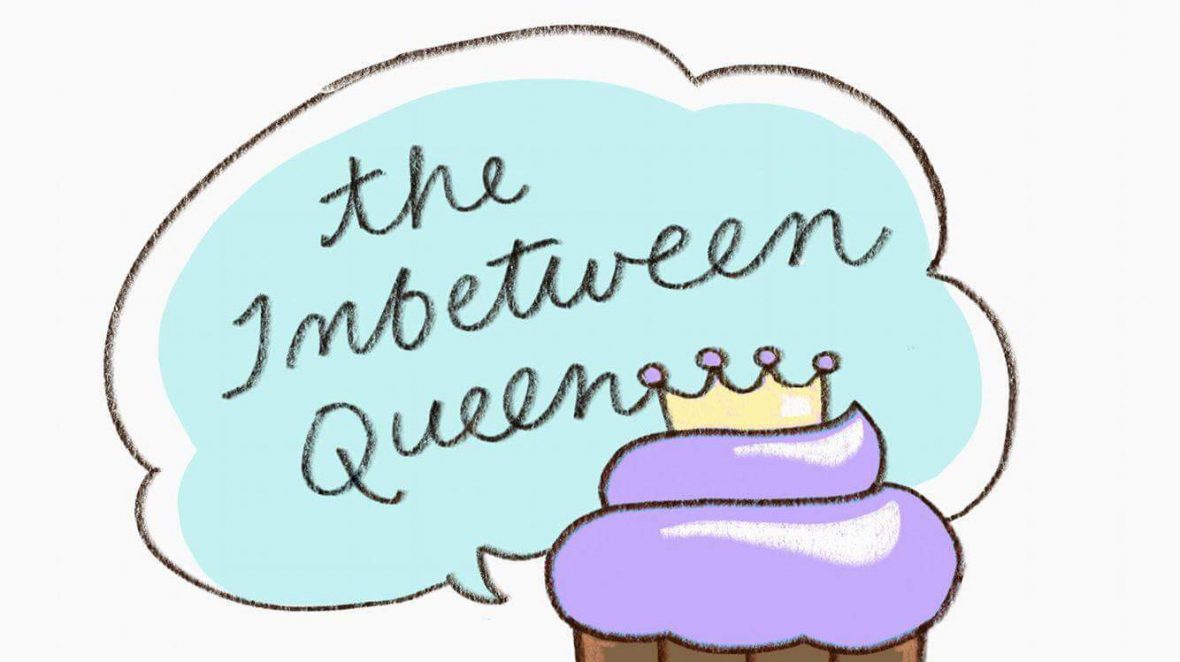

























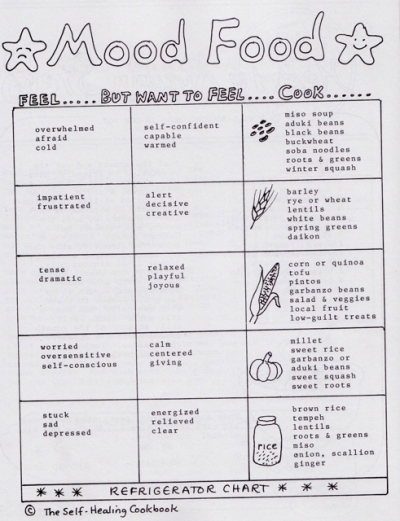
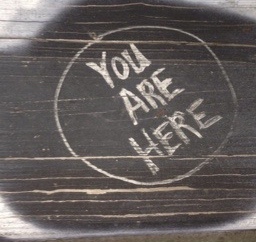 When I was in ninth grade, I found my dream school.
When I was in ninth grade, I found my dream school.


